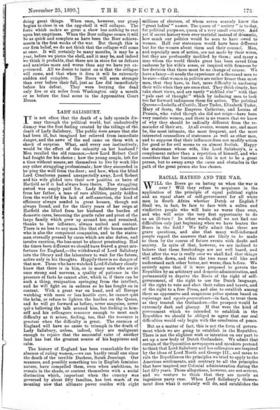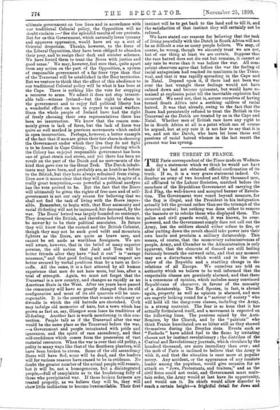RACIAL HATRED AND THE WAR.
WILL the Boers go on hating us when the war is over ? Will they refuse to acquiesce in the application of the principle of equal political rights and an equal share of self-government for all white men in South Africa whether Dutch or English ? Shall 'we, in fact, be face to face 'with a sullen, and vindictive people who will hate us worse than ever, and who will seize the very first opportunity to do us an ill-turn ? In other words, shall we not find our difficulties only just beginning when we have beaten the Boers in the field ? We fully admit that these are grave q.uestions, and also that many well-informed people regard the answers that are likely to be made to them by the course of future events with doubt and anxiety. In spite- of that, however, we are inclined to believe that these forebodings are not well based, and that after the war is really over we shall find that things will settle down, and that the two races will like and understand each other better, not Worse, than before. We entirely agree that if it were proposed to govern the Republics by an arbitrary and despotic administration, and permanently to deprive the Boers of the right of self- government, of the right to use the Dutch language, of the right to vote and elect their rulers and taxers, and of the right to a free Press, and also to establish among them an oppressive and suspicious police system based on espionage and. agents-provocateurs—in fact, to treat them as they treated the Outlanders—the prospect would be extremely dark and gloomy. If that were the kind of government which we intended to establish in the Republics we should be obliged to agree that our real difficulties would only begin with the conclusion of peace.
But as a matter of fact, this is not the form of govern- ment which we are going to establish in the Republics. There is not the slightest wish or intention on our part to set up a new body of Dutch Outlanders. We admit that certain of the Opposition newspapers and speakers pretend to think that Lord Salisbury and his colleagues are inspired by the ideas of Lord North and George III., and mean to rule the Republics on the principles we tried to apply to the American settlements, and contrary to all the principles that have inspiredpur Colonial administration during the last fifty years. Those allegations, however, are not serious, and we venture to think that they are merely an ingenious party. ruse. When Lord Salisbury's Govern- ment does what it certainly will do, and establishes the ultimate government on free lines and in accordance with our traditional Colonial policy, the Opposition will no doubt exclaim :—' See the splendid results of our protests. But for us this Government, which naturally loves tyranny and approves oppression, would have set up a sort of Oriental despotism. Thanks, however, to the force of the Liberal Opposition, they have been obliged to abandon their prey, and to resign their dark and sinister schemes. We have forced them to treat the Boers with justice and good sense.' We may, however, feel sure that, quite apart from any action on the part of the Opposition, a system of responsible government of a far freer type than that of the Transvaal will be established in the Boer territories. But we venture to think that the effect of this obedience to our traditional Colonial policy will be what it has been at the Cape. There is nothing like the vote for stopping a recourse to arms. We admit it does not stop treason- able talk—witness Ireland—but the right to share in the government and to enjoy full political liberty has a wonderful effect on men in regard to actual warfare. Since the whole people of Ireland have had the right of freely choosing their own representatives there has been no insurrection. We know that the reason com- monly given is lack of force, but the lack of force was quite as well marked in previous movements which ended in open insurrection. Perhaps, however, a better example of the fact that if men are given their fair share in choosing the Government under which they live they do not fight is to be found in Cape Colony. The period during which the Colony has enjoyed responsible government has been one of great strain and stress, and yet there has been no revolt on the part of the Dutch and no movements of the kind that gave rise to the Great Trek. The Dutch inhabi- tants may have been, and probably are, as hostile as before to the British, but they have always refrained from rising. Even now it seems clear that they will not rise, in spite of a really great temptation,—so powerful a political anodyne has the vote proved to be. But the fact that the Boers will ultimately be given the rights of free men and of self- government is not our only reason for believing that we shall not find the task of living with the Boers impos- sible. Remember, to begin with, that Boer animosity and racial ill-feeling will not be increased, but decreased, by the war. The Boers' hatred was largely founded on contempt. They despised the British, and therefore believed them to be unworthy to be their political associates. In future they will know that the rooinek and the British Colonist, though they may not be such good veldt and mountain fighters as the Boers, are quite as brave men, and cannot be set aside as worthless foreigners. We are well aware, however, that in the belief of many superior persons, the old notion that Jack and Tom will be better friends after they have "had it out" is "savage nonsense," and that good feeling and mutual respect are better secured by verbal poultices than by a turn at fisti- cuffs. All the same, it is a fact attested by all human experience that men do not hate more, but less, after a trial of strength. Again, we must not forget that the Transvaal is a new country, and changes as rapidly as an American State in the West. After ten years have passed the community will have so greatly changed that its old configuration and most of its old quarrels will be unre- cognisable. It is the countries that remain stationary or dwindle in which the old hatreds are cherished. Cork may indulge old memories of hate, but a town which has grown as fast as, say, Glasgow soon loses its traditions of ill-feeling. Another fact is worth mentioning in this con- nection. People talk as if the Transvaal after the war would be the same place as the Transvaal before the war, —a Government and people intoxicated with pride and ignorance, and the spirit of race ascendency, and that self-confidence which comes from the possession of vast material resources. When the war is over that old polity, a polity in many ways like that of the Southern planters, will have been broken to atoms. Some of the old ascendency Boers will have fled, some will be dead, and the leaders will for various reasons have ceased to be in evidence. No doubt the greater number of the actual people will remain, but it will be, not a homogeneous, but a disintegrated people,—full of complaints as to the headstrong folly of those who precipitated war. If these broken farmers are treated properly, as we believe they will be, they will show little inclination to become irreconcilable. Their first instinct will be to get back to the land and to till it, and the satisfaction of that instinct they will certainly not be refused.
We have stated our reasons for believing that the task of living peacefully with the Dutch in South Africa will not be as difficult a one as many people believe. We may, of course, be wrong, though we sincerely trust we are not, but of one thing at least we are certain. Suppose that the race hatred does not die out but remains, it cannot at any rate be worse than it was before the war. All com- petent observers agree that before the war the feeling of racial antagonism had reached its maximum in the Trans- vaal, and that it was rapidly spreading in the Cape and in Natal. Depend upon it, if there had not been war over the last wrangle these feelings would not have calmed down and become quiescent, but would have re- tuained at explosion point till the inevitable explosion had occurred. We need not, that is, accuse ourselves of having turned South Africa into a seething caldron of racial hatred. It was that already, owing to the fact that the Boers had persistently refused to treat the British in the Transvaal as the Dutch are treated by us in the Caps and Natal. Whether men of British race have any right to be in South Africa at all is a point which can of course be argued, but at any rate it is not fair to say that it is we, and not the Dutch, who have let loose those evil passions of racial hatred whence in the last resort the present war has sprung.











































 Previous page
Previous page